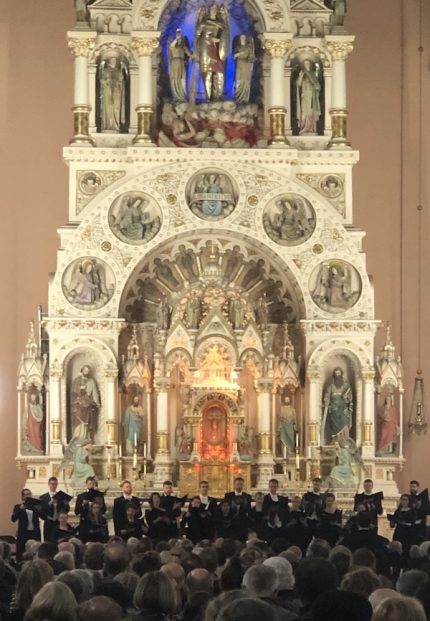Quigley makes admirable debut with MOB in holiday program

Every December, Music of the Baroque offers its “Holiday Brass and Choral Concerts” as its contribution to the city’s musical yuletide celebrations. As the ensemble approaches its 50th anniversary next year, these annual programs of exquisite though lesser-known seasonal fare are still going strong, offering a welcome alternative to the inescapable Messiahs and Nutcrackers that pepper the Christmas cultural calendar.
Tradition changed slightly this year. Longtime MOB chorus director William Jon Gray retired in May, which allowed Patrick Dupré Quigley to make his ensemble debut leading the holiday offering Friday night at St. Michael’s Church in Old Town. Possessed of an inviting stage presence, Quigley— artistic director of the Miami-based choir Seraphic Fire—curated an intelligent international program, and his leadership throughout the evening was clear if occasionally workmanlike.
Friday night’s concert led off with Johann Vierdanck’s Capriccio a 3 cornetti as a curtain-raising fanfare, in which an inauspicious splat proved unfortunate. The MOB brass was more prominently featured in this program than in years past. When firing on all cylinders they had the burnished sheen one has come to expect Friday night; but fitful false notes and some unconvincing ensemble routinely detracted from their offerings of Gabrieli, Victoria, and others.
The choral contribution began with two examples of plainsong, the Chorus men austerely chanting “Puer natus est” from the 13th-century Graduale Sarisburiense, followed by the women eloquently floating St. Hildegard of Bingen’s “O, antiqui sancti” from Ordo Virtutum. These were followed to great effect by a setting of “Hodie Christus natus est” by Louis-Nicolas Clerambault: following the monophony of the plainsong, the triadic harmonies of this latter selection gave the effect of lights coming on in the sanctuary.
Next was Spanish music of the 16th century. The brass took up positions alongside the audience while the chorus remained up front for Francisco Guerrero’s “Duo seraphim,” enveloping the audience for this ecstatic evocation of angels shouting the good news; Quigley’s assertive direction kept the separate forces unified. Gaspar Fernandes’ “Xicochi conetzintle” received lovely treatment, and the chorus earned special plaudits for making the thorny Quechua lines of “Hanacpachap cussicuinin” sound effortlessly natural. (Try to make the lyric “Chipchijcachac catachillai” roll off your tongue.)
The first half concluded with “Tomorrow Shall Be My Dancing Day” and “In dulci jubilo,” the well balanced Chorus luminous in these familiar selections.
Christmas music of 17th-century Germany highlighted the second portion of the program. A setting by the prolific Anonymous of “Maria durch ein Dornwald ging” felt similar to the most effective visual depictions of the Annunciation, harmonically capturing Mary’s mixed feelings upon hearing what familiarity may lead us to forget is some pretty bizarre news. Quigley led Friedrich Spee’s rendering of “Vom Himmel hoch, ihr Engel, kommt” with a gentle lilt appropriate to a lullaby.
The concert closed in customary fashion with the Solemn Tone “Te Deum laudamus” and Praetorius’s setting of “Es ist ein Ros’ entsprungen,” though Quigley freshened things up with offbeat harmonizations by Hugo Distler and Jan Sandström.
Each year audiences can look forward to watching three MOB chorus members get an arm workout in the Solemn Tone “Te Deum laudamus” as they perform the hypnotic five-note descending accompaniment with handheld chimes, while their colleagues again assume antiphonal positions around the audience. This year’s rendering was as elevated as those in years past. The Praetorius ended the evening on a serene, reflective note, a welcome point of respite in what can be a hectic season.
The program will be repeated 3 p.m. Saturday and Sunday at Divine Word Chapel in Northbrook. Patrick Dupré Quigley returns to lead Music of the Baroque in music of Rebel and Rameau April 5 and 6 at the North Shore Center and Harris Theater, respectively. baroque.org
Posted in Uncategorized




